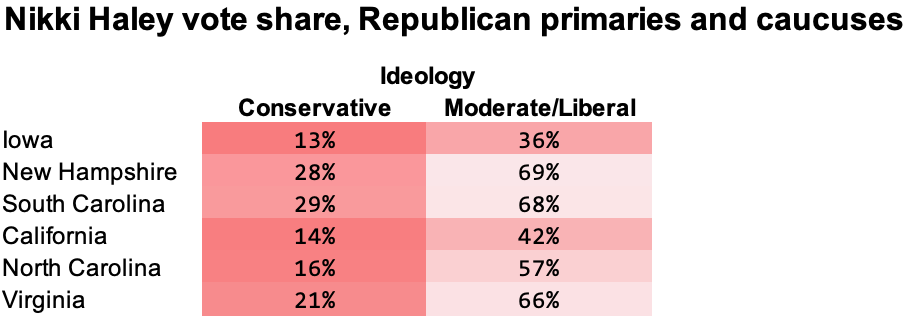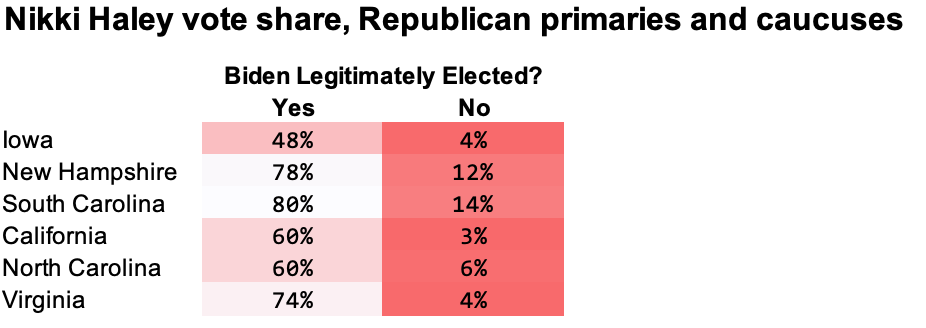Nikki Haley's problem is America's problem
If here's a healthy conservative movement, it's not located in the vicinity of the Republican Party.
I wasn’t planning to write off the results of Super Tuesday, in part because I didn’t want to step on yesterday’s long diagnosis of the White House’s dangerous habit of denying the challenges that Joe Biden will face against Donald Trump, and in part because, well, the results have been inevitable for a long time. With Nikki Haley dropping out, Donald Trump will be the Republican nominee unless he unexpectedly chooses to step aside or is forced to by a medical emergency. And the same holds for Joe Biden and the Democratic nomination.
Technically speaking, neither man had a clean sweep. Haley won Washington D.C. and an actual state, Vermont; not coincidently, these are the two jurisdictions where Trump received his lowest share of the vote in the 2020 general election. Biden lost the American Samoa caucus to someone or something named Jason Palmer. I guess you could say this reflects a lack of due diligence for the White House but c’mon, Biden has roughly three dozen bigger problems to worry about and the American Samoa caucus is weird, having been the only contest that Michael Bloomberg and his $1 billion campaign won in 2020.
The most optimistic take on Haley, as I wrote in December, is that her position is analogous to that of John McCain in 2000; McCain won seven contests, not two, but ultimately was little more than a speed bump for George W. Bush on his route to the Republican nomination. However, McCain won the next open Republican nomination race in 2008. Don’t get me wrong: you could do a lot worse than Haley, as all the other Republicans who ran against Trump in 2024 and almost all of them who ran against him in 2016 did. At least she’ll be able to look at the Wikipedia page for some visual evidence of her presence in the race, something Ron DeSantis will never be able to do.
But after looking at some exit poll data, I think the McCain framing is too optimistic.
Here is one key data point. From AP/Fox News and CNN/National Election Pool exit polling1 , this is the share of the vote won by Haley among voters who described themselves as conservative or as moderate or liberal, respectively:
So, yeah. If there had been an electorate consisting only of moderate Republican voters — including, in several of these states, independents and Democrats who crossed over to vote on the GOP side — Haley, despite being a former Tea Party star and far from a true moderate herself, would be the frontrunner for the nomination. But she’s winning very little support from self-described conservative Republicans — just 14 percent in California, for instance, and only 29 percent in South Carolina, the state where she was once governor. This is a contrast to McCain, who actually narrowly edged out Bush (within the margin of error) 37-36 among conservative voters in the New Hampshire primary in 2000.
I’m less hung up on what the term “conservative” means than I am about “liberal”. Liberal has a much more specific historical origin, one that was vital in the founding of the United States and other liberal democracies, and which is obscured by the American tendency to use “liberal” as a synonym for “left”. True liberals can have a healthy amount of respect for a strain of conservatism that upholds certain of these traditions, like individual liberty and the rule of law, even if they hope to discard others.
I am not prone to hyperbole about Trump, but he very much is not in that tradition, obviously. January 6 was a dangerous, radical insurrection that undermined the rule of law and the democratic process. A second Trump term would at the very least almost certainly entail a massive expansion of executive powers and — although I’m more optimistic about the checks-and-balances of the American system and particularly the role of the courts than some commentators — potentially even push the Republic to the brink.
And Trump’s strain of conservatism is the dominant strain of conservatism in the modern Republican Party. Here is the other key data point from the exit polls: the share of the vote won by Haley among voters who did and did not think that Biden legitimately won the 2020 election:
Haley won a clear plurality of caucusgoers in Iowa who thought Biden was legitimately elected and a sizable majority of them everywhere else. However, she won almost no votes from election deniers: just 3 percent in California and only 14 percent even in her home state of South Carolina.
Of course, the problem isn’t so much that there aren’t Haley-supporting election deniers as that there are a lot of election deniers, period: these voters outnumbered those who thought Biden was legitimately elected by as much as 2:1 in some GOP primaries.
Look, you can find plenty of takes elsewhere on what a second Trump term would mean. Part of my feeling of resignation throughout the primaries has been that the country has a lot of problems to navigate whether he wins or loses. If Biden limps across the finish line and wins re-election, he’d likely be an unpopular lame duck, with Democrats facing significant headwinds in 2026 and 2028 and — don’t forget this — Trump still having one more eligible term left (he’d be no older in 2028 than Biden is now). Haley did somewhat better than polls and “expectations” suggested that she would, and if you’re an extremely committed Bayesian who wants competing political parties and competing ideological traditions, perhaps you can read that optimistically. But the votes of 49.9 percent of Vermonters do not a healthy Republican Party make.
If both organizations conducted an exit poll in a state, I just averaged the results together.






We don’t like Haley because she’s a neocon warmonger. No more forever wars. Say what you will about Trump, but he doesn’t want the country bogged down by endless wars.
"January 6 was a dangerous, radical insurrection that undermined the rule of law and the democratic process."
C'mon Nate. Your analysis is usually insightful and helpful, and I appreciate it. But you really hurt your credibility when say stuff like that.